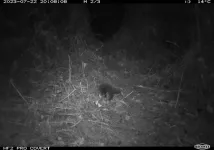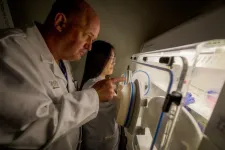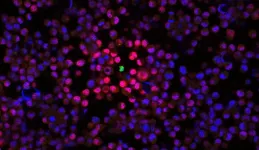(Press-News.org) Students who feel they have been victimized because of social characteristics such as their ethnicity or their sexuality are at additional risk of trauma, a new national US study has revealed.
Published in the peer-reviewed Journal of School Violence, the research, of more than 2,200 young victims of bullying, found students reported that their physical health; self-esteem; social relationships, and schoolwork suffered more if they felt bias was behind the perpetrators’ actions.
This was particularly acute for those who felt they had more than one characteristic which put them at risk of discrimination.
Schools’ anti-bullying and violence prevention programs should place more emphasis on these types of prejudicial victimization, the findings conclude, and staff should work to identify those whose characteristics might make them particularly vulnerable.
“This study adds to the rising tide of evidence demonstrating that adolescent victimization motivated by bias is uniquely impactful. And I find that victimization involving multiple bias types appears to be especially influential,” states author Allison Kurpiel of the Pennsylvania State University.
“Students who experienced biased victimization were also more likely than nonbiased victims to perceive negative effects on their schoolwork, implying that biased victimization might contribute to lower educational achievement for minoritized groups. This association between biased victimization and impacts on schoolwork was observed for students across the academic spectrum.
“The findings demonstrate that schools should prioritize programming that targets the reduction of biased victimization.
“Failing to do so could result in the exacerbation of existing inequalities through damage to students’ self-esteem, physical health, social relationships, and educational achievement.”
Allison, who is a PhD Candidate in the Department of Sociology and Criminology at Pennsylvania, investigated data on under-18s who filled in a School Crime Supplement to the 2017 and 2019 National Crime Victimization Survey – a nationally representative household survey conducted every two years in the United States.
Students were asked whether in the past year anyone had made fun of them, called them names, insulted them in a hurtful way, spread rumors about them or tried to make others dislike them, threatened them, pushed, shoved, tripped or spat on them, or tried to make them do things they did not want to do, such as giving away money. They were also asked if they had been excluded on purpose from activities or had their property destroyed in a non-accidental way.
Those who said they had been victimized in one or more of these ways were asked if they had ever thought this was related to their race, religion, ethnic background, disability, gender, sexual orientation or physical appearance. They were then divided into two groups: those who said they had felt their experience was the result of these types of bias, and those who said they had not.
The research then analyzed the impacts on the victims, asking whether those who felt they experienced more than one type of bias were more likely to suffer adverse effects than those who suffered just one.
The study found around a quarter of all students had been victimized in the past year, and of those, around four out of 10 felt the actions were motivated by bias. The most commonly-reported bias – around three out of 10 of those who felt bias was a factor – related to physical appearance.
The most common forms of victimization were being threatened or being subject to the spreading of rumors, and these were each experienced by around two-thirds of victims. Overall, students who reported bias against them felt they had suffered a greater range of types of victimization than those who did not.
When it came to the perceived impacts, negative effects on self-esteem were the most common and were reported by more than a quarter of victims, while effects on physical health were the least common and were experienced by fewer than one in seven.
Those who felt their victimization was linked to bias were three times more likely to suffer negative effects on their self-esteem, the research found, and also had increased odds of damage to their physical health, social relationships and schoolwork.
Those who felt they suffered more than one type of bias had higher odds of experiencing all four of the negative effects which were measured. For example, each additional type of reported bias reported raised the odds of reporting negative effects on schoolwork by 70 per cent. Girls were more likely than boys to suffer all four negative effects, as were those who had lower grades.
“Peer aggression which involves prejudice causes additional harm and can threaten schools’ abilities to create inclusive learning environments,” adds Ms Kurpiel.
Her paper recommends schools should “work to raise awareness of these issues” and that prevention programs should aim, in particular, to identify students who are at risk because of multiple factors in their lives.
“One potential intervention is to increase school organizations designed to promote inclusivity, such as Gay Straight Alliance clubs, which have been demonstrated as effective for reducing multiple types of bias-based bullying among female students who identify as LGBT,” she states.
The results of the paper should be assessed while considering some limitations.
For example, all possible types of victim impacts were not measured, so “biased victimization might not be associated with greater odds of impacts than nonbiased victimization for some unmeasured outcomes (e.g., risky behavior)”, the study declares.
Factors related to the school climate that could be important for understanding the impacts of biased victimization (e.g., support groups) were not accounted for due to their lack of measurement in the data.
END
Bullying victims who perceive they’re targeted due to social characteristics feel the effects worse, new research suggests
“Schools should do more to support children at risk of discriminatory bullying”
2023-11-10
ELSE PRESS RELEASES FROM THIS DATE:
Any activity is better for your heart than sitting – even sleeping
2023-11-10
The study, supported by the British Heart Foundation (BHF) and published in the European Heart Journal, is the first to assess how different movement patterns throughout the 24-hour day are linked to heart health. It is the first evidence to emerge from the international Prospective Physical Activity, Sitting and Sleep (ProPASS) consortium.
Cardiovascular disease, which refers to all diseases of the heart and circulation, is the number one cause of mortality globally. In 2021, it was responsible for one in three ...
Health: Lack of friend or family visits is associated with increased risk of dying
2023-11-10
Never being visited by friends or family is associated with an increased risk of dying, according to a study published in BMC Medicine. The authors suggest that their findings could be used to help identify patients at a higher risk of dying due to social factors, and to develop more effective interventions to combat the increased risk of death associated with social isolation.
Although previous research has identified associations between deaths due to any causes and both a ‘sense of loneliness’ and living alone, the combined impacts of different types of social interaction ...
Aid agencies are failing patients with breast cancer in war zones meaning more will develop advanced disease
2023-11-10
Lisbon, Portugal: Patients with breast cancer in conflict zones around the world are being “massively under-served” by governments, UN aid agencies and other non-governmental organisations (NGOs), Professor Richard Sullivan told the Advanced Breast Cancer Seventh International Consensus Conference (ABC 7). [1]
Among people fleeing conflict zones, either displaced within their own country or across borders to other countries, patients with breast cancer are the “single largest group of cancer patients that present to UN agencies and international NGOs,” said Prof. Sullivan, who is director of the Institute of Cancer Policy and co-director of the Centre for ...
Is the US reporting system for vaccine safety broken?
2023-11-10
Is the US reporting system for vaccine safety broken?
Investigation raises concerns that the system is not operating as intended and signals are being missed
A US reporting system designed to detect potential safety issues with vaccines is supposed to be user-friendly, responsive, and transparent. But an investigation published by The BMJ today finds it’s not meeting its own standards.
The Vaccine Adverse Event Reporting System (VAERS), co-managed by the US Centers for Disease Control and Prevention (CDC) and the Food and Drug Administration (FDA), collects reports of symptoms, ...
Gut bacteria protects against diarrhoeal disease
2023-11-10
Gut bacteria protects against diarrhoeal disease
Peer reviewed - Systematic review – people and animals
The severity of a diarrhoeal disease could be down to the bacteria in your gut – according to new research from the University of East Anglia.
Cryptosporidiosis is responsible for over 100,000 deaths annually – predominantly in children under five.
It also affects animals, and a new study published today shows that large animals – including primates - with less different ...
Found at last: Bizarre, egg-laying mammal finally rediscovered after 60 years
2023-11-10
A long-beaked echidna named after Sir David Attenborough and last seen by scientists in 1961 has been photographed for the first time in an Indonesian tropical forest.
An international team of researchers worked with local communities to deploy over 80 camera traps to film the elusive animal.
Besides rediscovering the echidna, the team uncovered a wealth of species completely new to science, including beetles, spiders, and a remarkable tree-dwelling shrimp.
A wide range of images and video footage from the expedition are available (see link below).
More than sixty years after it was last recorded, an expedition ...
WHO updates its guidance on treatments for COVID-19
2023-11-10
A panel of international experts representing the World Health Organization’s Guideline Development Group has updated its guidance on treatments for patients with covid-19.
The new recommendations published by The BMJ are part of a living guideline, developed by the World Health Organization with the methodological support of MAGIC Evidence Ecosystem Foundation, to provide up to date, trustworthy guidance on the management of covid-19 and help doctors make better decisions with their patients.
The guidance ...
UTHealth Houston researchers awarded $2.6 million NIH grant to study molecular pathways and potential strategies for treatment of myocardial ischemia and reperfusion injury
2023-11-10
A four-year, $2.6 million grant to study circadian rhythm and novel therapies to protect the heart during a heart attack or cardiac surgery has been awarded to UTHealth Houston by the National Heart, Lung, and Blood Institute, part of the National Institutes of Health.
Principal investigator Holger Eltzschig, MD, PhD, professor, and co-investigator Wei Ruan, MD, PhD, assistant professor, from the Department of Anesthesiology, Critical Care and Pain Medicine at McGovern Medical School at UTHealth Houston, are studying translational, pharmacologic, and interventional strategies targeting ...
What human diseases can teach us about the immune system
2023-11-10
The immune system is a crucial part of our survival, regularly fending off wide-ranging attacks on the body, both internal and external. Unsurprisingly, the elegant defense system that protects us from viruses, bacterial infections, cancer, and other threats is immensely complicated. Each time it mounts a response, it must quickly and carefully orchestrate communication across vast numbers of cells and molecules.
Jennifer Oyler-Yaniv is working to figure out how, exactly, the immune system does this — and when and why it fails.
“There's always the next question, the next ...
Texas A&M researchers contribute to international project studying coronavirus transmission in humans, cattle
2023-11-10
Researchers from the Texas A&M School of Veterinary Medicine and Biomedical Sciences’ (VMBS) Veterinary Education, Research, and Outreach (VERO) program have joined an international team studying how coronaviruses are spread and whether an individual’s microbiome (the collection of microbes living in or on the body) might impact that transmission.
Coronaviruses are a family of viruses that can cause a variety of diseases in many species, from the common cold and severe acute respiratory syndrome (SARS) in people, to diarrhea in calves and respiratory disease in ...
LAST 30 PRESS RELEASES:
Middle-aged men are most vulnerable to faster aging due to ‘forever chemicals’
Starving cancer: Nutrient deprivation effects on synovial sarcoma
Speaking from the heart: Study identifies key concerns of parenting with an early-onset cardiovascular condition
From the Late Bronze Age to today - Old Irish Goat carries 3,000 years of Irish history
Emerging class of antibiotics to tackle global tuberculosis crisis
Researchers create distortion-resistant energy materials to improve lithium-ion batteries
Scientists create the most detailed molecular map to date of the developing Down syndrome brain
Nutrient uptake gets to the root of roots
Aspirin not a quick fix for preventing bowel cancer
HPV vaccination provides “sustained protection” against cervical cancer
Many post-authorization studies fail to comply with public disclosure rules
GLP-1 drugs combined with healthy lifestyle habits linked with reduced cardiovascular risk among diabetes patients
Solved: New analysis of Apollo Moon samples finally settles debate about lunar magnetic field
University of Birmingham to host national computing center
Play nicely: Children who are not friends connect better through play when given a goal
Surviving the extreme temperatures of the climate crisis calls for a revolution in home and building design
The wild can be ‘death trap’ for rescued animals
New research: Nighttime road traffic noise stresses the heart and blood vessels
Meningococcal B vaccination does not reduce gonorrhoea, trial results show
AAO-HNSF awarded grant to advance age-friendly care in otolaryngology through national initiative
Eight years running: Newsweek names Mayo Clinic ‘World’s Best Hospital’
Coffee waste turned into clean air solution: researchers develop sustainable catalyst to remove toxic hydrogen sulfide
Scientists uncover how engineered biochar and microbes work together to boost plant-based cleanup of cadmium-polluted soils
Engineered biochar could unlock more effective and scalable solutions for soil and water pollution
Differing immune responses in infants may explain increased severity of RSV over SARS-CoV-2
The invisible hand of climate change: How extreme heat dictates who is born
Surprising culprit leads to chronic rejection of transplanted lungs, hearts
Study explains how ketogenic diets prevent seizures
New approach to qualifying nuclear reactor components rolling out this year
U.S. medical care is improving, but cost and health differ depending on disease
[Press-News.org] Bullying victims who perceive they’re targeted due to social characteristics feel the effects worse, new research suggests“Schools should do more to support children at risk of discriminatory bullying”


